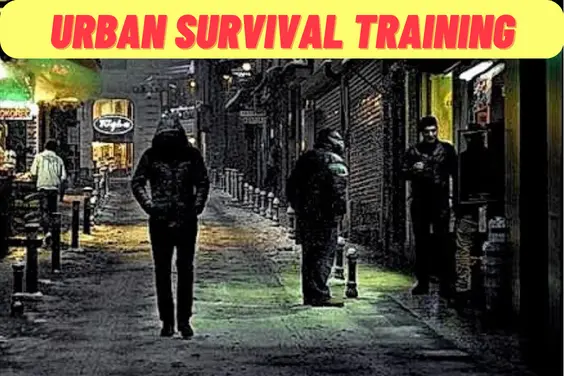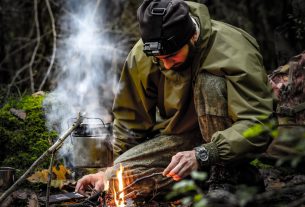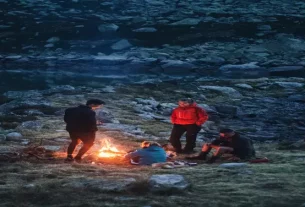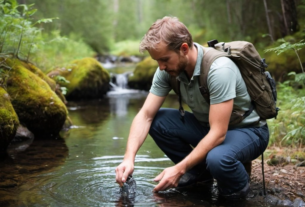Detroit Urban Survival Training takes center stage in the heart of a city renowned for its resilience and tenacity. Going beyond conventional self-defense measures, mastering urban survival in Detroit requires a multifaceted approach that integrates mental preparedness, strategic physical fitness, and an in-depth understanding of the city’s unique landscape. This article delves into the nuances of Detroit Urban Survival Training, surpassing the fundamentals of self-defense to embrace a holistic and proactive strategy for preparedness.
I. Introduction
Understanding the Need for Urban Survival Training
Detroit, with its dynamic urban landscape, necessitates a paradigm shift in how we approach survival training. Beyond being a mere precaution, urban survival training becomes a lifestyle, a mindset ingrained in the very fabric of daily life. The need for such training is not just about responding to extreme situations but about fostering a preparedness mentality that can be applied across various urban challenges.
Why Detroit is an Ideal Training Ground
Detroit’s unique combination of urban sprawl, high-risk neighborhoods, and diverse demographic challenges makes it an ideal training ground. The city’s history has taught its inhabitants the importance of being ready for the unexpected, making it a living laboratory for urban survival training.
II. The Basics of Urban Survival Training
Defining Urban Survival Training
Urban survival training extends beyond the realm of self-defense, encompassing a wide array of skills crucial for navigating the complexities of city life during crises. From mental preparedness to practical skills, it is a comprehensive approach to facing challenges head-on.
The Importance of Mental Preparedness
Mental resilience is the cornerstone of urban survival. In a city where unforeseen circumstances can arise at any moment, the ability to stay calm under pressure, think strategically, and adapt to rapidly changing situations is invaluable.
Essential Skills for Surviving in an Urban Environment
Navigating the urban jungle demands a diverse skill set. From situational awareness to adaptability and resourcefulness, urban survival training covers the foundational skills that can mean the difference between safety and vulnerability.
III. Exploring Detroit’s Unique Challenges
Understanding Detroit’s Urban Landscape
Detroit’s urban landscape is marked by a blend of vibrant communities and areas facing economic challenges. Urban survival training in Detroit involves understanding and adapting to this diverse environment.
Recognizing Potential Threats and Dangers
The ability to identify potential threats is a crucial aspect of survival in any urban setting, and Detroit is no exception. From understanding crime patterns to being aware of environmental risks, urban survival training equips individuals with the knowledge needed to navigate safely.
Navigating High-Risk Neighborhoods
Certain neighborhoods pose unique challenges. Urban survival training in Detroit includes strategies for safely navigating high-risk areas, emphasizing avoidance when possible and preparedness when avoidance is not an option.
IV. Self-Defense Techniques for Urban Survival
Leveraging Martial Arts for Self-Defense
While self-defense is a fundamental component, urban survival training in Detroit acknowledges the effectiveness of martial arts in enhancing physical capabilities and instilling discipline.
Practical Combat Techniques for Urban Environments
Urban settings demand practical combat techniques tailored to confined spaces and unexpected scenarios. Detroit’s urban survival training focuses on techniques that are effective in real-world, close-quarters situations.
Improvised Weapons and their Effective Use
Beyond traditional self-defense tools, urban survival training explores the effective use of everyday items as improvised weapons. This resourcefulness is a hallmark of Detroit’s survival philosophy.
V. Beyond Self-Defense: Psychological Preparedness
Developing a Survival Mindset
Survival in Detroit’s urban landscape requires more than physical skills; it demands a survival mindset. This involves cultivating a mental attitude that embraces challenges as opportunities for growth and adaptation.
Overcoming Fear and Anxiety in Urban Settings
The city can be overwhelming, and fear can be paralyzing. Urban survival training equips individuals with techniques to overcome fear and anxiety, enabling them to make clear-headed decisions even in the face of uncertainty.
Psychological Strategies to Outsmart Adversaries
Surviving in Detroit often involves outsmarting potential threats. Urban survival training delves into psychological strategies that can be employed to anticipate and counteract the actions of adversaries.
VI. Physical Fitness for Urban Survival
The Importance of Physical Conditioning
Urban survival is physically demanding. From navigating uneven terrain to responding to emergencies, being in optimal physical condition is a key component of Detroit’s urban survival training.
Tailoring Exercise Routines for Survival Situations
Exercise routines are designed to mimic the challenges of urban survival. High-intensity interval training, functional strength exercises, and agility drills prepare individuals for the physical demands of an urban environment.
Building Endurance and Strength for Urban Challenges
Surviving in Detroit requires endurance and strength. Urban survival training includes progressive conditioning to build physical resilience for the challenges that may arise.
VII. Urban Navigation and Evasion Tactics
Reading Urban Maps and Navigating City Streets
The ability to navigate city streets is a fundamental urban survival skill. Detroit’s urban survival training provides insights into reading maps effectively and choosing optimal routes.
Effective Evasion Techniques in Crowded Areas
Urban environments can become crowded and chaotic during crises. Evasion tactics are taught to enable individuals to navigate through crowded areas efficiently, minimizing risks and optimizing escape routes.
Urban Camouflage and Blending Techniques
Remaining inconspicuous can be an advantage. Urban survival training explores techniques for blending into the urban landscape, offering a level of camouflage that can enhance personal safety.
VIII. Shelter and Resource Management in Urban Environments
Finding Adequate Shelter in Urban Settings
Detroit’s urban survival training emphasizes the importance of identifying safe shelters in an urban environment. From abandoned buildings to community centers, understanding where to find refuge is a critical skill.
Utilizing Available Resources in Emergencies
Resourcefulness is a key element of urban survival. Training focuses on the ability to identify and utilize available resources during emergencies, ensuring that basic needs are met even in challenging situations.
Water and Food Procurement Strategies
Access to water and food can be challenging in an urban crisis. Urban survival training includes strategies for procuring these essential resources, whether from existing supplies or through resourceful means.
IX. Communication and Information Gathering
Establishing Reliable Communication Channels
Maintaining communication is vital during crises. Detroit’s urban survival training covers methods for establishing and maintaining reliable communication channels, both within groups and with external support.
Gathering Information during Crises
The ability to gather information is a powerful tool. Urban survival training includes techniques for collecting critical information during crises, aiding in decision-making and response strategies.
Utilizing Technology for Survival Advantage
In an age of advanced technology, urban survival training in Detroit incorporates the use of gadgets and applications that can provide a significant advantage in terms of communication, navigation, and information gathering.
X. Survival Group Dynamics in Urban Scenarios
Forming and Managing Survival Groups
The importance of community in urban survival cannot be overstated. Training includes guidance on forming and managing survival groups, fostering a collaborative approach to tackling challenges.
Establishing Roles and Responsibilities
Within a survival group, defined roles and responsibilities are crucial. Detroit’s urban survival training ensures that individuals understand their roles, promoting efficiency and synergy within the group.
Resolving Conflicts and Maintaining Harmony
Conflicts can arise in high-stress situations. Urban survival training equips individuals with conflict resolution skills, ensuring that interpersonal dynamics within a group remain constructive and harmonious.
XI. Urban Medical Preparedness
Understanding Urban Medical Challenges
Urban settings present unique medical challenges. Training covers the specifics of providing medical assistance in an urban environment, from understanding common injuries to dealing with large-scale emergencies.
Basic First Aid Skills for Urban Survival
Essential first aid skills are a cornerstone of urban survival. Training includes instruction on immediate response techniques, addressing injuries promptly to prevent complications.
Handling Common Injuries and Ailments in Urban Areas
Detroit’s urban survival training includes scenarios specific to the city, preparing individuals to handle injuries and ailments that may be prevalent in an urban setting.
XII. Urban Survival Gear and Equipment
Essential Gear for Urban Survival
The urban survival kit is tailored to the challenges of Detroit. From basic tools to specialized equipment, the training emphasizes the importance of having a well-curated kit at all times.
Choosing the Right Tools for Various Situations
Different situations demand different tools. Urban survival training guides individuals on selecting the right tools for various scenarios, ensuring that the kit remains versatile and effective.
Proper Maintenance and Triage of Equipment
Having the right gear is only part of the equation. Detroit’s urban survival training instills the importance of regular maintenance and triage, ensuring that equipment is in optimal condition when needed.
XIII. Tactical Driving Skills for Urban Survival
Maneuvering through Urban Traffic and Obstacles
Urban traffic can be a significant obstacle during emergencies. Training includes tactical driving skills to navigate through traffic efficiently and safely.
Defensive Driving Techniques for Evacuation
Defensive driving is a key component of urban survival. Techniques for defensive driving during evacuations are taught to ensure safe and effective movement through the city.
Utilizing Vehicles as a Tactical Advantage
Vehicles can be strategic assets in urban survival. Training explores ways to utilize vehicles as a tactical advantage, whether for evacuation or as a means of shelter.
XIV. Situational Awareness and Risk Assessment
Developing and Maintaining Situational Awareness
Situational awareness is the foundation of urban survival. Detroit’s training continually emphasizes the need to be aware of one’s surroundings, recognizing potential threats and opportunities.
Assessing Risks and Making Sound Decisions
Risk assessment is a skill developed through training. Individuals learn to assess risks systematically, enabling them to make sound decisions in high-pressure situations.
Predicting and Navigating Threats in Urban Landscapes
Beyond immediate situational awareness, training includes the ability to predict and navigate potential threats in Detroit’s urban landscape, allowing for proactive responses to emerging challenges.
XV. Urban Survival in Natural Disasters
Coping with Natural Disasters in Urban Settings
Natural disasters pose unique challenges in urban environments. Training covers coping strategies specific to Detroit, considering potential threats like floods, storms, and earthquakes.
Surviving Earthquakes, Floods, and Storms
Specific survival techniques are taught for various natural disasters. From earthquake preparedness to flood survival strategies, Detroit’s urban survival training ensures individuals are equipped for diverse scenarios.
Preparing for Impending Natural Disasters
Preparedness is key to survival. Training includes proactive measures individuals can take to prepare for impending natural disasters, minimizing risks and optimizing responses.
XVI. Prepping and Stockpiling for Urban Emergency Scenarios
Building an Urban Survival Kit
A well-equipped survival kit is a fundamental aspect of urban preparedness. Detroit’s training guides individuals in building comprehensive survival kits tailored to the city’s challenges.
Stockpiling Essential Supplies and Resources
Stockpiling is more than hoarding; it’s strategic preparation. Training provides insights into essential supplies and resources that should be stockpiled for urban survival scenarios.
Long-Term Urban Survival Preparations
Survival isn’t just about immediate needs. Detroit’s urban survival training includes guidance on long-term preparations, ensuring sustained resilience in extended emergency situations.
XVII. Urban Survival for Vulnerable Populations
Survival Strategies for Children and Elderly in Cities
Vulnerable populations require specialized strategies. Detroit’s training addresses the unique needs of children and the elderly in urban survival scenarios.
Women’s Safety and Self-Defense in Urban Environments
Gender-specific concerns are addressed in urban survival training. Women’s safety and self-defense techniques are integrated to empower individuals to navigate urban challenges confidently.
Helping Homeless and Disadvantaged Individuals in Crisis
In times of crisis, community support is crucial. Training includes guidance on how to assist homeless and disadvantaged individuals, fostering a sense of collective responsibility.
XVIII. Strategies for Survival during Civil Unrest and Riots
Navigating Civil Unrest and Demonstrations
Civil unrest presents unique challenges. Urban survival training includes strategies for safely navigating through demonstrations and civil disturbances.
Self-Protection and Evasion Tactics during Riots
In the event of riots, self-protection is paramount. Detroit’s training covers evasion tactics and defensive strategies to navigate safely through riotous situations.
Bugging-In vs. Bugging-Out during Chaotic Situations
Deciding whether to stay put or evacuate is a critical decision. Training provides individuals with the information needed to make informed choices during chaotic situations.
XIX. Urban Survival Training as a Lifestyle
Incorporating Urban Survival into Everyday Life
Survival isn’t just a skill; it’s a lifestyle. Detroit’s urban survival training encourages individuals to incorporate preparedness into their daily routines, fostering a constant state of readiness.
Practicing Skills and Drills for Continued Preparedness
Mastery comes through practice. Training emphasizes the importance of regular drills and skill-building exercises to ensure continued preparedness.
Encouraging Community Resilience through Training
A resilient community is a prepared community. Detroit’s training extends beyond individuals, encouraging community-wide initiatives that enhance overall resilience.
XX. Conclusion
Recapitulating the Importance of Detroit Urban Survival Training
In conclusion, mastering urban survival in Detroit goes beyond the confines of self-defense, encompassing a holistic approach to preparedness.
Embracing Preparedness for Urban Challenges
The city’s unique challenges demand an active embrace of preparedness, a mindset that sees every challenge as an opportunity for growth and adaptation.
FAQs: Detroit Urban Survival Training
Addressing common questions provides additional insights, ensuring that individuals considering urban survival training in Detroit are well-informed.
Is urban survival training only for extreme situations in Detroit?
Urban survival training is not just for extreme situations; it’s a lifestyle that prepares individuals for the challenges of city living.
Can anyone benefit from urban survival training, regardless of physical fitness level?
Absolutely. Urban survival training is adaptable to different fitness levels, focusing on building capabilities rather than expecting a certain baseline.
What are the costs associated with urban survival training programs in Detroit?
Costs vary, but the investment in urban survival training is invaluable compared to the potential benefits and enhanced safety.
How long does it take to become proficient in urban survival techniques?
Proficiency is a journey, and the timeline varies. Regular practice and ongoing learning are integral to mastery.
Are there any legal considerations when using self-defense techniques in Detroit?
Understanding self-defense laws is crucial. Urban survival training often includes legal aspects to ensure responsible and lawful actions.
Can urban survival training be self-taught or is professional instruction necessary?
While some aspects can be self-taught, professional instruction provides structured learning and valuable insights from experienced trainers.
What are some recommended resources for further urban survival training in Detroit?
Local survival schools, online courses, and community organizations can be excellent resources for ongoing urban survival training.
In essence, mastering Detroit urban survival training is a transformative journey that goes beyond the physical to encompass mental preparedness, community resilience, and a constant state of readiness. By embracing this comprehensive approach, individuals can navigate the challenges of city living with confidence and resilience, turning adversity into opportunity.



